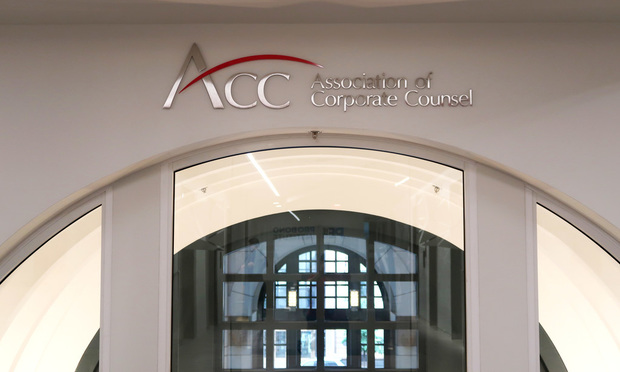Closing Gender Pay Gap a Hot Topic at ACC Event
A cultural shift that has sparked new laws and regulation, plus lawsuits, is driving in-house counsel's interest in gender pay audits.
September 30, 2019 at 04:44 PM
4 minute read
 Association of Corporate Counsel offices. (Courtesy photo)
Association of Corporate Counsel offices. (Courtesy photo)
Gender pay equity has become an increasing concern for companies large and small, because of an onslaught of tougher government legislation and regulations, particularly at the state level, and lawsuit risks for unexplained pay gaps.
Now an increasing number of companies are undertaking voluntary pay audits to identify any such gaps, according to several participants at a Sept. 26 pay equity event organized by the Association of Corporate Counsel Georgia chapter's Women's Initiative. The event, held at Georgia State University's College of Law building, attracted about 75 in-house counsel from a range of local companies. Almost all of the attendees were women.
"I'm seeing more focus on this issue by clients," said panelist Alec Grecu, a labor economist at Mercer Consulting, the world's largest HR consultancy. He said clients are devoting more of their budgets to identifying gender pay gaps via pay equity audits.
The audits are designed to spot unexplained pay gaps among employees performing similar jobs and at similar experience levels; quantify the median amount of the gaps; and determine what factors are causing them.
The aim is to "identify pockets of risk" for unexplained pay gaps, Grecu said.
"We are seeing more clients interested in pay equity audits and compensation programs in general," said Jennifer Sandberg, a Fisher & Phillips partner who moderated one of the small-group discussions following the panel.
Two factors are driving the increase in clients' requests for assistance, said Sandberg, a member of FisherPhillips' pay equity practice.
First, an increasing number of states are passing pay equity laws that are more stringent than existing federal law. Also, the Equal Employment Opportunity Commission set a Sept. 30 deadline for companies with 100 or more employees to disclose much more detailed compensation data for employees by gender and race or ethnicity.
What's more, a "culture shift" is driving an increase in class-action wage-discrimination suits, Sandberg said. "While suffering through those lawsuits, employers realize that they have pay equity issues."
Companies need to make sure they can "explain any pay gaps in a valid way," said Mary Ulmer-Jones, an associate general counsel for Bank of America handling employment law issues for several divisions.
It's better for a company to catch "unexplained risk pockets" through their own audit, she said, rather than to discover gender pay gaps because of lawsuits or government inquiries (which can be triggered if a company is a federal contractor).
Audit Benefits
Beyond risk avoidance, Ulmer-Jones added, closing gender pay gaps produces a "cultural payoff," by better positioning a company to attract and retain talent.
"Think about the cost you incur in bringing someone in, training them and having them become a subject-matter expert. You don't want that person leaving and going to your competition," said Ulmer-Jones of Bank of America. "We are an employer of choice for women because of the work we've done."
Gender pay audits can lead to larger conversations among management on how the company tracks and rewards performance, Ulmer-Jones said, emphasizing that approaching gender pay equity is a continually evolving process.
Beyond pay gaps for the same job level, women tend to be employed in lower-paying types of jobs, said another panelist, Deborah Dinner, an Emory University law school professor who studies gender and class equity in the marketplace. "We need to look at how women and men are channeled into different types of jobs."
Women often track into lower-paying jobs at law firms and companies because of the "lack of a family-friendly environment," Dinner said, adding that women take more leave to have children or take care of ailing family members.
Eversheds Sutherland special counsel Anna Halsey, one of the committee members for the ACC Georgia Womens' Initiative event, said the group hopes to keep the conversation going with additional events on pay equity and related topics.
Read More:
Pay Equity Practices Take Off as New Gender Pay Gap Laws Spread
Strong Demand Fuels Growth for Big Four Labor and Employment Firms
This content has been archived. It is available through our partners, LexisNexis® and Bloomberg Law.
To view this content, please continue to their sites.
Not a Lexis Subscriber?
Subscribe Now
Not a Bloomberg Law Subscriber?
Subscribe Now
NOT FOR REPRINT
© 2025 ALM Global, LLC, All Rights Reserved. Request academic re-use from www.copyright.com. All other uses, submit a request to [email protected]. For more information visit Asset & Logo Licensing.
You Might Like
View All

Alston & Bird, Baker Hostetler, Holland & Knight Promote Partners in Southeast
5 minute read

Trending Stories
Who Got The Work
Michael G. Bongiorno, Andrew Scott Dulberg and Elizabeth E. Driscoll from Wilmer Cutler Pickering Hale and Dorr have stepped in to represent Symbotic Inc., an A.I.-enabled technology platform that focuses on increasing supply chain efficiency, and other defendants in a pending shareholder derivative lawsuit. The case, filed Oct. 2 in Massachusetts District Court by the Brown Law Firm on behalf of Stephen Austen, accuses certain officers and directors of misleading investors in regard to Symbotic's potential for margin growth by failing to disclose that the company was not equipped to timely deploy its systems or manage expenses through project delays. The case, assigned to U.S. District Judge Nathaniel M. Gorton, is 1:24-cv-12522, Austen v. Cohen et al.
Who Got The Work
Edmund Polubinski and Marie Killmond of Davis Polk & Wardwell have entered appearances for data platform software development company MongoDB and other defendants in a pending shareholder derivative lawsuit. The action, filed Oct. 7 in New York Southern District Court by the Brown Law Firm, accuses the company's directors and/or officers of falsely expressing confidence in the company’s restructuring of its sales incentive plan and downplaying the severity of decreases in its upfront commitments. The case is 1:24-cv-07594, Roy v. Ittycheria et al.
Who Got The Work
Amy O. Bruchs and Kurt F. Ellison of Michael Best & Friedrich have entered appearances for Epic Systems Corp. in a pending employment discrimination lawsuit. The suit was filed Sept. 7 in Wisconsin Western District Court by Levine Eisberner LLC and Siri & Glimstad on behalf of a project manager who claims that he was wrongfully terminated after applying for a religious exemption to the defendant's COVID-19 vaccine mandate. The case, assigned to U.S. Magistrate Judge Anita Marie Boor, is 3:24-cv-00630, Secker, Nathan v. Epic Systems Corporation.
Who Got The Work
David X. Sullivan, Thomas J. Finn and Gregory A. Hall from McCarter & English have entered appearances for Sunrun Installation Services in a pending civil rights lawsuit. The complaint was filed Sept. 4 in Connecticut District Court by attorney Robert M. Berke on behalf of former employee George Edward Steins, who was arrested and charged with employing an unregistered home improvement salesperson. The complaint alleges that had Sunrun informed the Connecticut Department of Consumer Protection that the plaintiff's employment had ended in 2017 and that he no longer held Sunrun's home improvement contractor license, he would not have been hit with charges, which were dismissed in May 2024. The case, assigned to U.S. District Judge Jeffrey A. Meyer, is 3:24-cv-01423, Steins v. Sunrun, Inc. et al.
Who Got The Work
Greenberg Traurig shareholder Joshua L. Raskin has entered an appearance for boohoo.com UK Ltd. in a pending patent infringement lawsuit. The suit, filed Sept. 3 in Texas Eastern District Court by Rozier Hardt McDonough on behalf of Alto Dynamics, asserts five patents related to an online shopping platform. The case, assigned to U.S. District Judge Rodney Gilstrap, is 2:24-cv-00719, Alto Dynamics, LLC v. boohoo.com UK Limited.
Featured Firms
Law Offices of Gary Martin Hays & Associates, P.C.
(470) 294-1674
Law Offices of Mark E. Salomone
(857) 444-6468
Smith & Hassler
(713) 739-1250






